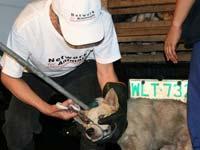‘Horrific dog meat trade’

Half-a-million dogs in the Philippines end up in restaurants annually after they are snatched from streets
Half-a-million dogs in the Philippines end up in restaurants annually after they are snatched from streets and illegally slaughtered to satisfy the growing taste for dog meat, animal activists in London say.
And this week they have mounted an international campaign, urging dog lovers everywhere, including Canada to sign a petition to stop what they call “the horrific dog meat trade”.
Customers dine on dog’s head for the equivalent of about $4, the express.co.uk reported.
A dish of dog liver costs about two dollars while a particular favourite, deep fried paws, are about one dollar.
Bars serve dog meat snacks known as “pulutan” with drinks just as British pub-goers might enjoy a bag of crisps.
The grisly trade flourishes in the north of the Philippines where there is a long tradition of eating dog meat despite warnings from the authorities about the dangers to health and the introduction of jail terms for dog meat traders, the report said.
Simon Powell, of the British-based NGO Network For Animals, which is leading the campaign against the practice, is leading the Britain-based non-profit organization in lobbying the Philippines government to enforce its anti-dog meat legislation.
It is also intercepting dog snatchers, who transport the animals to slaughterhouses in appalling conditions, and is campaigning to change public opinion about the practice.
“These restaurants sell dog meat only and generally by lunchtime they are packed. Particularly popular is pulutan, a dog meat bar snack. Another very popular dish is deep fried dog paws, known as ‘spare parts’.
“I went into the kitchen and there on a stainless steel platter was a pile of dog meat and on top of it the boiled head of a dog,” Simon Powell of Network For Animals said.
“It was bizarre and surreal to see what we regard as man’s best friend and a pet regarded as legitimate food,” he added.
The ‘Kennel Club’ has also announced that it will join the campaign against “the horrific dog meat trade”.
“While the Kennel Club recognises that in certain cultures the consumption of dog meat may be deemed to be traditional or associated with particular health benefits, we do not believe that these arguments can justify animal cruelty,” the club’s communications director Caroline Kisko said.
The British-based charity Network For Animals says although the trade was outlawed in 1998, government inaction and police corruption have allowed it to expand.
Teams from the charity, acting in partnership with informants and officials, risk their lives to intercept vans on the way to slaughterhouses. They find the dogs in appalling conditions. The temperature inside the vans can reach 100F and many of the animals do not survive even after being rescued. For those that do, the charity works with the authorities to help them recover and be rehomed.
It also funds local publicity campaigns highlighting the cruelty of the trade and the threat to people from the spread of rabies. Its 12-year campaign has led to the rescue of more than 3,000 dogs, the conviction of 86 dog meat traders, and the closure of 26 slaughterhouses, but it warns much more needs to be done.
British Tory MP Mark Pritchard, chairman of the All Party Parliamentary Group for the Philippines, has raised the issue with Filipino authorities including the mayor of the capital city Manilla and now plans to lobby President Benigno Aquino.
He said: “This activity does a huge amount of damage to the Philippines’ international reputation and I will be raising this issue with the president who must take action.
“We are asking the Filipino government to enforce their laws prohibiting the barbaric dog meat trade and take action against those who openly flout these laws. The trade in dog meat is not only illegal - the dogs involved are subjected to immense cruelty in the time leading up to their death. Dehydration are asphyxiation are common deaths on the way to the slaughterhouse, not to mention the high risk of rabies transmission associated with keeping masses of dogs together in confined spaces. This inhumane treatment of dogs should not be allowed to continue unchecked, The Network for Animals said in a press release.






